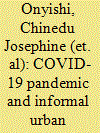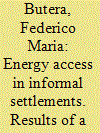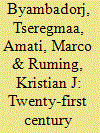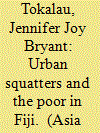|
|
|
Sort Order |
|
|
|
Items / Page
|
|
|
|
|
|
|
| Srl | Item |
| 1 |
ID:
180687


|
|
|
|
|
| Summary/Abstract |
The outbreak and spread of coronavirus disease (COVID-19) is probably the most serious global challenge since World War II. While research has paid considerable attention to the technical, epidemiological and public health aspects of the pandemic in Africa, it neglects the social, economic and political dimensions. Relying on analysis of data on trends of COVID-19 infections from the World Health Organization and Africa Centres for Disease Control and Prevention, and a rapid review of available international and national policy/programme documents on COVID-19 control responses in Africa, this study assessed the extant protocols and responses to COVID-19 in relation to urban governance principles. Utilizing the political economy framework, the social conditions of informal labour and business activities during the COVID-19 pandemic are explored with accession to social habitus of informality. The paper argues that in as much as the COVID-19 pandemic is a pervasive health problem it should be treated more as a social and political economy challenge given the large informal nature of urbanism in Africa. The study concludes that urban governance that incorporates collective organization, community groups, non-state and informal actors offers scope in the battle against COVID-19 in Africa. Rethinking African urbanism in line with the principles of the Global Campaign on Urban Governance is also canvassed.
|
|
|
|
|
|
|
|
|
|
|
|
|
|
|
|
| 2 |
ID:
169724


|
|
|
|
|
| Summary/Abstract |
This paper presents the results of a survey on two informal settlements in Rio De Janeiro: Reta Velha (Itaboraí) and Jardim Bom Retiro (São Gonçalo). A detailed analysis of energy access and energy poverty level has been accomplished by questionnaires carried out in 400 households. The questionnaire was based on a detailed multi-tier approach. It was aimed at exploring the actual energy access and energy poverty in favelas, in addition to draw the local living conditions and the availability of the basic services. The outcomes of the research underline the problem of outages and low tension, and illegal connections. Furthermore, electricity consumption is very high compared to the service provided, and expenditures are generally disproportioned to the households’ income. Many interesting outcomes emerge from the survey. Referring to energy poverty, it is a status in which 50% of households are in Jardim Bom Retiro and 20% in Reta Velha. Due to the representativeness of the treated case, the results permit the definition of the state of the art and of enhancing guidelines suitable also for other contexts, at least in the universe of informal settlements in Latin America and Caribbean.
|
|
|
|
|
|
|
|
|
|
|
|
|
|
|
|
| 3 |
ID:
160822


|
|
|
|
|
| Summary/Abstract |
Addressing intertwined socio-economic and environmental problems in informal urban areas underscores the need for just sustainability. The co-production of urban housing provides a useful domain to link issues related to sustainability with social and environmental justice. Using the example of an informal settlement re-blocking project, this paper shows how co-production as an approach might or might not promote principles ingrained in just sustainability. The study relied on data collected through semi-structured interviews with residents and key informants as well as transect walks within the settlement. The case shows that working towards just sustainability is not straight-forward. It demands efforts that navigate, with foresight rather than hindsight, the dynamics in multi-scalar contexts into which informal settlements are embedded. Social and institutional structures, processes and relationships producing and reproducing material distribution are crucial to entrenching the just sustainability praxis.
|
|
|
|
|
|
|
|
|
|
|
|
|
|
|
|
| 4 |
ID:
159220


|
|
|
|
|
| Summary/Abstract |
This article explores the intersections of theory and community knowledge, experiences and imagination to illustrate how Kyrgyzstan’s informal settlements contest both normative politics and current global security practices. Instead of viewing informal settlements or the Kyrgyzstani state as disparate objects on and by which security is respectively imposed and enacted, how security differences are pronounced, circulated, resisted and reformulated through Rancièrian politics is examined. In this process, the Kyrgyz community-relational concept of yntymak is brought forth as a vital practice of organization and place-making in and against adversarial attempts at governance. Reconfiguring politics around specific community practices exposes the utilitarian shortcomings of neoliberal governance methods and typical conceptions of security.
|
|
|
|
|
|
|
|
|
|
|
|
|
|
|
|
| 5 |
ID:
106702


|
|
|
| 6 |
ID:
132406


|
|
|
|
|
| Publication |
2014.
|
| Summary/Abstract |
Pacific land issues are not only about Indigenous ownership in rural areas. Within urban areas in particular, land historically alienated into State control produced consequences only now being realised. In Fiji, all State land is claimed by communal landowners and such claims were said to be one reason for the 2006 coup. It has been suggested in recent times that urban informal settlements on the qoliqoli (coastal and foreshore land) are at risk and face increasing challenges from landowners. This paper examines a neglected area of urban State land in Fiji and comments on the future of the urban poor in Fiji if land tenure is unresolved.
|
|
|
|
|
|
|
|
|
|
|
|
|
|
|
|
| 7 |
ID:
193028


|
|
|
|
|
| Summary/Abstract |
Globally, the proliferation of informal settlements continues unabated, challenging us to understand life in these risk-prone urban ‘hotspots’. Although women and children are vulnerable to risks in these marginalised environments, young men are more often considered generators of risk while their own susceptibilities are disregarded. Addressing this oversight, this study, undertaken in informal areas of Cape Town, South Africa, using a range of qualitative methods, investigated the vulnerabilities of young Xhosa men. The findings reveal conflicted masculine identities, shaped by the complex environments young men encounter in navigating life on the margins. Demonstrating the tensions shaping their identities and behaviour, the nature of their vulnerabilities is shown to be constructed over time in response to the changing landscapes young men encounter. It also reveals how they develop individualised defence mechanisms and coping strategies to survive in these environments, contesting the hegemonic forms of masculinity they are more often labelled with.
|
|
|
|
|
|
|
|
|
|
|
|
|
|
|
|
|
|
|
|
|